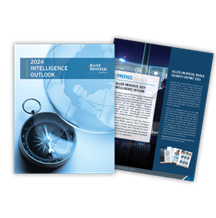
By: Rachelle Loyear and Marielle DeWicki
In today's interconnected world, businesses often find themselves tackling a range of challenges. One challenge that stands out is the ever-evolving landscape of global risk. To help you navigate the complexities of the coming year around the globe, Allied Universal® has released its 2024 Intelligence Outlook. In this and upcoming posts, we will analyze the findings and break them down to point out some high-level trends, what they might mean for your security program, and how to start thinking about mitigating risks that might impact you in 2024.
In the coming weeks, we'll explore the full report.
In this article, we're covering the Politics, Geopolitics and Economics sections of the report. From regulatory twists to security concerns and supply chain disruptions, it's a complex terrain. We're here to help navigate it and provide practical solutions to protect your organization's assets when the political and economic storms threaten.
Trend Highlights
As detailed in the Allied Universal 2024 Intelligence Outlook, 2024 has the potential to become a fairly turbulent year in terms of political, geopolitical and economic events. Multiple countries will hold national elections, conflicts are expected to persist in the Ukraine and various African and Middle Eastern countries and territories, and full economic recovery from the COVID-19 pandemic is not expected in many parts of the world.
Businesses worldwide are likely to experience a variety of operational, reputational and physical security challenges and will therefore need comprehensive measures to plan for and adapt to the changing risk environment. In this briefing, we address business-specific risks that are likely to result from the anticipated global political, geopolitical and economic climate and suggest various risk mitigation strategies.
Risks to Corporate Security
While every business is unique, the political and economic trends outlined above and detailed in the Intelligence Outlook have the potential to have a real impact on many different types of business and operations across the globe. Some of the risk areas that corporate security teams should be on the lookout for related to global political trends are:
- Conflict: Domestic and transnational conflict present significant physical security and operational concerns for businesses operating in affected locations. Damage to assets and facilities and loss of life caused by projectiles and other weaponry is possible, and combat in the area is certain to either fully suspend or disrupt operations. For companies not operating in such areas, their supply chains may be disrupted – potentially slowing and raising operation and production costs – if supply chain affiliates are located in these locations.
- Crime: Crime is likely to be heightened in conflict zones, as well as areas with political and economic instability, as affected locations are often unable to provide basic public and security services. Prominent businesses and businesspeople in these areas may be popular targets for opportunistic crime, such as theft, due to perceived wealth. In unstable environments, the potential for violent crime also increases, as does the potential for attacks on assets and facilities and assaults on personnel.
- Legislation: New government administrations mean new policy directions to which businesses need to adapt, though new laws can require businesses to modify their operations, supply chains and business models. New ESG legislation and sanctions can be among the most disruptive, requiring increased reporting and due diligence standards, along with potential changes to operations and supply chains. Noncompliant businesses risk reputational damage, protests, investigations, fines, contract losses and other penalties.
- Unrest: Public or employee grievances against companies’ political views, position on unionization, or employee compensation (among other topics) can result in protests against employers, especially prominent multinational corporations. Potential effects may include operational and transportation disruption, vandalism or damage to assets or property, injuries to personnel, reputational damage, and financial losses. Indirect effects for businesses in the vicinity of unrest but not specifically targeted by demonstrators include transportation disruption, injuries to employees who are bystanders, and incidental vandalism.
Tactics and Solutions for Risk Mitigation
While the risks listed above are serious, there are mitigating steps that can be taken to potentially lessen either vulnerability and exposure to the threats or to reduce the impact to assets in the event an incident occurs. Some of the ideas here are more specific to security, while others might be shared with and applied to other organizational functions as well. Let’s look at some of the potential tactics to address political and economic risks.
- Due diligence and compliance teams: Maintaining these teams can aid in proactively identifying new legislation that could relate to a business, devise strategies for and ensure legal compliance, and discover current or potential associates who may present a compliance or reputational threat.
- Nearshoring or friend-shoring: Sourcing products from locations closer to operational centers and from business-friendly and stable locations instead of unstable or conflict zones can help reduce the risk of supply chain shortages and associated operating and product cost hikes.
- Private-sector intelligence: Utilizing private-sector intelligence services can help businesses identify location, industrial sector, or company-specific threats in real time, helping businesses identify, plan for, and mitigate potential risks.
- Physical barriers for protection: The use of perimeter fencing, security guards, and access cards can help protect the physical safety of employees, assets, and facilities and reduce the risk of bad actors breaching a facility and threatening physical security.
As security professionals, we understand the value of readiness. The ever-changing world of political instability and economic rises and falls may potentially be disruptive to business, but with a proactive mindset and the right strategies, we can navigate the challenges and protect an organization's assets.
Remember to stay informed about political and economic developments, build strong relationships with local experts, and continuously assess your security and compliance measures. By following these best practices, you'll be better positioned to keep your organization resilient in the face of uncertainty.
The content we covered today is not the full Global Intelligence picture. This is the first in a series of articles exploring the Allied Universal 2024 Intelligence Outlook. Our next article will focus on the Security, Civil Unrest, Terrorism and Crime trends. We will provide an outlook and the factors that might influence your security program in the coming year in those areas.
Download the Allied Universal® 2024 Intelligence Outlook here.










